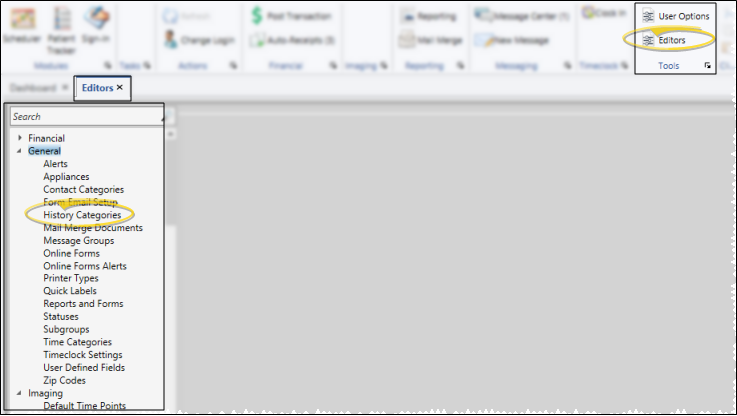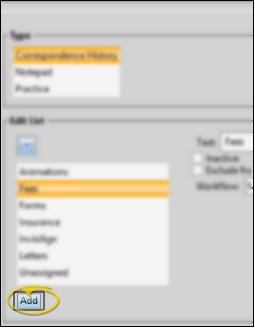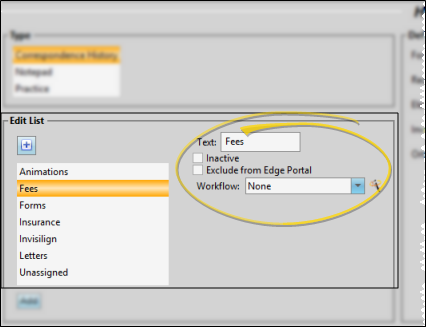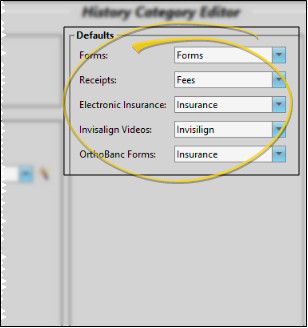Set Up History Categories
Use the History Category
Choose Your Settings
-
 Open History Categories Editor - Home ribbon bar > Tools section > Editors > General > History Categories. (You can also use the Search field to look for the editor you want to work with.)
Open History Categories Editor - Home ribbon bar > Tools section > Editors > General > History Categories. (You can also use the Search field to look for the editor you want to work with.) -
 Select List to Work With - Select the type of category list to work with.
Select List to Work With - Select the type of category list to work with. -
 Create or Edit Category - Choose an existing record, or create a new one. Once you create a record, you cannot delete it. You can, however, flag it Inactive. Records you flag as Inactive are not available for general use, but they remain in your system for reporting and other data collection needs. In addition, you can toggle records back to Active whenever needed.
Create or Edit Category - Choose an existing record, or create a new one. Once you create a record, you cannot delete it. You can, however, flag it Inactive. Records you flag as Inactive are not available for general use, but they remain in your system for reporting and other data collection needs. In addition, you can toggle records back to Active whenever needed. -
 Edit Category List - Select the category to work with, then make your changes in the Edit List section of the window.
Edit Category List - Select the category to work with, then make your changes in the Edit List section of the window. -
 Default Categories - This section of the editor applies to the Correspondence History category only. Use these fields to assign a default category description to several types of forms. When you run one of these forms, it is automatically saved in the appropriate correspondence history with the selected category.
Default Categories - This section of the editor applies to the Correspondence History category only. Use these fields to assign a default category description to several types of forms. When you run one of these forms, it is automatically saved in the appropriate correspondence history with the selected category. -
 Save Changes - Click
Save Changes - Click  Save in your Quick Access toolbar or File ribbon bar (or press Ctrl+S on your keyboard) to save any changes you have made.
Save in your Quick Access toolbar or File ribbon bar (or press Ctrl+S on your keyboard) to save any changes you have made.
More Information
Merge Document Category - Use the Mail Merge Document editor to select the Correspondence History category description to assign to each document. See "Create and Edit Mail Merge Documents" for details.
![]() Editor History - When you open more than one editor without leaving the Editors window, a history of those editors appears at the top of your screen. You can click a name in the history to return to any previously opened editor, easily going back and forth between editors. This is useful, for example, when you are working with editors that are related to one another, such as the Treatment Chart Style editor and the Treatment Chart List editor.
Editor History - When you open more than one editor without leaving the Editors window, a history of those editors appears at the top of your screen. You can click a name in the history to return to any previously opened editor, easily going back and forth between editors. This is useful, for example, when you are working with editors that are related to one another, such as the Treatment Chart Style editor and the Treatment Chart List editor.
www.ortho2.com │ 1107 Buckeye Ave. │ Ames, IA 50010 │ 800.346.4504 │ Contact Us
Chat with Software Support │ Chat with Network Engineering │ Chat with New Customer Care
Remote Support │ Email Support │ Online Help Ver. 11/11/2019


 Show / Hide Inactive icon at the top of the window to include both active and inactive records.
Show / Hide Inactive icon at the top of the window to include both active and inactive records.














